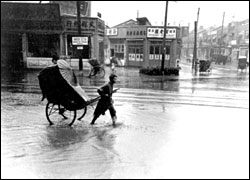It’s not too late to embrace your faithor just to check out some Semitic-minded movies during the second half of the Seattle Jewish Film Fest. (It continues at the Cinerama through Sunday, March 16; tickets and info: 206-325-6500 and www.ajcseattle.org).
Among the highlights is Shanghai Ghetto (5 p.m. Wednesday, March 12). Shanghai was the only destination in the world open to Jews without passports during their brief window of escape from Nazism in the late 1930s. Several thousand German Jews who had money and foresight embarked on that long steamship voyage, and this fascinating, first-rate documentary tells their story. From a life of urbane sophistication in Vienna and Berlin, these refugees showed up near-penniless in a disease-ridden, and very foreign, flood-prone city. The filmmakers interview a half-dozen people who were children at the time, all of whom are now touchingly articulate and insightful about their experience in this fleeting ghetto, which disbanded as soon as the Americans won the war.
Kedma (9:15 p.m. Wednesday, March 12) represents a disappointment from Israel’s pre-eminent director, Amos Gitai, who depicts a group of European Jews landing in the Palestine countryside at the dawn of the state of Israel. A slow-developing series of set pieces portray the young emigrants as they climb off the boat, get chased by British troops, join up with Zionist forces to attack an Arab outpost, and stare into space. Long ponderous silences are interrupted by moments of brief, ponderous dialogue”If you want to live, you also have to forgive.” Scenes begin and end with an empty landscape, as the characters drift into the frame and then depart, as if the story were being told from the perspective of the contested land itself. But Kedma comes off more as a set of philosophical ideas and stylistic concepts than a movie. – MARK D. FEFER
THE ABSORBING one-hour doc My Terrorist (6:30 p.m. Thursday, March 13) raises all kinds of thorny questions about terrorism and forgiveness. Director Yulie Cohen Gerstel was a young El-Al stewardess in 1978 London when Iraqi-born Fahad and other terrorists attacked her flight crew, injuring her and killing a colleague. Two decades later, liberal Yulie scoffs at Sharon’s hard-line policies and the “disgrace” of occupation. She lobbies for Fahad’s release from a British prison; predictably, her decision sparks tabloid-TV recriminations and the ire of the slain stewardess’ family. Over and over, with the second intifada raging around her, Cohen Gerstel muses ambivalently about how, or if, an individual act of forgiveness can possibly help break the larger cycle of violence and retribution. She’ll attend the screening and will take questions after.

Pvt. Marowitz clowns around with Hitler’s hat in 1945.
photo: Jeff Krulik |
On the lighter side are two documentaries shown together (3 p.m. Sunday, March 16): The Tramp and the Dictator and Hitler’s Hat. Tramp tells the back story of Charlie Chaplin’s 1940 The Great Dictator, the first Hollywood film to directly attack Hitler. Look for some amazing color home movies taken on the set, seamlessly integrated into the movie’s original black-and-white footage. Hat relates how a Jewish GI found Hitler’s top hat in 1945. At their 2000 army reunion, Richard Marowitz and his aging former foxhole buddies trade recollections that are alternately hilarious and sad. It’s all very Band of Brothers, with welcome bits of shtickplus several vintage movie clipsthrown in.
The Oscar-nominated short doc The Collector of Bedford Street (1 p.m. Sunday, March 16) is standard feel-good fare, following mentally retarded Larry Selman around his West Village neighborhood in Manhattan. Living in a rent-controlled brownstone apartment, he becomes a kind of pet political cause for his oh-so-liberal-and-concerned neighbors, who eventually set up a trust fund for the guy with the assistance of the UJA-Federation. It’s cute, but for nostalgic New Yorkers only.








